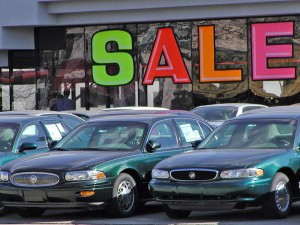While you may be scraping together the cash needed to cover the tax bill due by next week, millions of other Americans have been claiming or already receiving big refund checks – and that’s good news for automakers and auto dealers.
While there are no hard statistics that indicate precisely how many taxpayers take their refund checks over to the local showroom, industry experts say that’s helped fuel strong sales of both new and used vehicles in recent weeks, though the surge will likely soon wind down.
The year began a little more slowly than Ricky Beggs, senior editor of the used car pricing guide, The Black Book, had expected, but began to surge in March and he says, “I think this has been tax-driven.”
Due to budget compromises began Congress and the White House, as well as the more recent sequestration that has slashed federal spending, Beggs said this year’s tax-driven surge began a few weeks later than expected, however, and could run a little later into the spring than normal.
In 2012, the average tax refund ran to $2,803 and about three-quarters of American taxpayers received at least some money back. Those claiming refunds tend to file a bit earlier than those owing money, historically, which helps explain why the market feels the impact well ahead of the IRS’s well-known April 15 filing deadline.
“Tax refunds typically help to boost sales at this time of year” said Alec Gutierrez, senior analyst at Kelley Blue Book. “This year was no different as (U.S. car sales) sales hit the highest monthly total since August 2007 last month, thanks in part to tax refunds.”
Of course, there have been other factors nudging the market into higher gear. There’s a slow but ongoing economic recovery, and that has fueled so-called “pent-up demand” after half a decade of car sales running well below the anticipated trendline.
Meanwhile, the age of the average vehicle now on U.S. roads has risen to a record 11 years, “so many people have to replace them” because their older jalopies are simply no longer operational, stressed Beggs.
While even the richest Americans often qualify for tax refunds, those who use the cash back specifically for a car purchase “tend to be entry-level buyers, rather than luxury buyers,” according to The Black Book editor. And they’re far more likely to buy used than new.
Their purchases tend to fall into three market niches: entry level models, entry-midsize vehicles and upper-midsize products.
While hard data is elusive, Beggs said that some dealers he has visited in recent months time their own inventory plans around tax season and may see as much as a 30% bump in sales when the IRS starts mailing out checks.
On the whole, that number is likely high, however. Nationwide, “would I say potentially 10% of the (used car) business is based on refund checks (this time of year)? That’s a fair number.”


It has been documented that many people are starting to increase their debt in the past 12 months and it’s no surprise that the auto industry is benefiting form this. Some of the increased sales is due to people holding off on new vehicle purchases or leases because of the economic recession that is far from over. Eventually they are forced to make a decision when their lease is up or their current vehicle becomes too expensive to maintain.
Those of means who are not impacted by the economic recession just continue to buy or lease every 2-3 years which keeps the auto industry afloat.